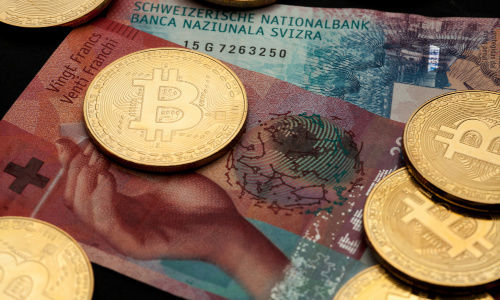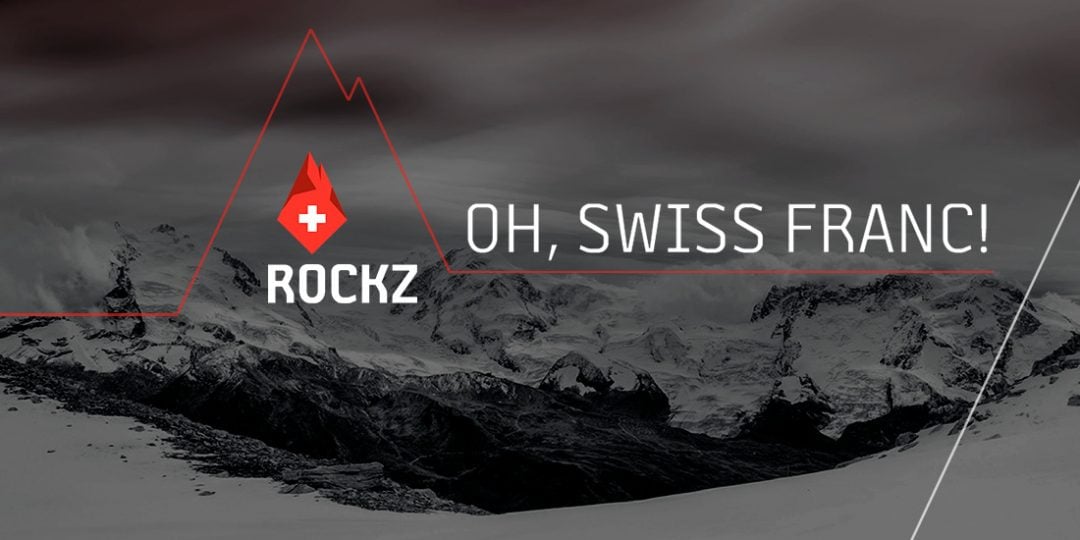$ 0.000 %
CryptoFranc (XCHF) Rank 15119
| Mkt.Cap | $ 0.00000000 | Volume 24H | 0.00000000XCHF |
| Market share | 0% | Total Supply | 0.00000000XCHF |
| Proof type | N/A | Open | $ 0.00000000 |
| Low | $ 0.00000000 | High | $ 0.00000000 |
CryptoFranc
Before deciding to trade in financial instrument or cryptocurrencies you should be fully informed of the risks and costs associated with trading the financial markets, carefully consider your investment objectives, level of experience, and risk appetite, and seek professional advice where needed. You can transfer XBT or ETH to/from an external wallet that you own personally (transfer support for other cryptocurrencies is planned for a future update). Cryptocurrency payments and transfers to/from third parties directly from your Swissquote account are not allowed. The Swissquote Bank financial platform sees more traffic than anything comparable in Switzerland and is secure and user-friendly. The research and analysis tools and real-time information it provides give you everything you need to invest in the financial markets.
Ready to start trading?

Nevertheless, French law has already recognised the possibility of registering certain assets into a blockchain, namely for cash vouchers, i.e. “minibons”, and unlisted securities, and may evolve in the future to also recognise a crypto-asset registered into a blockchain. Finally, we note that, due to the AML and KYC challenges raised by the holding of crypto-assets, French banks have been reluctant to open bank accounts to token issuers, which has hindered the development of ICOs and crypto/blockchain projects. The Pacte Act addresses this issue by providing that financial institutions must establish objective, non-discriminatory and proportionate rules governing access to bank accounts for token issuers which have obtained the AMF visa.
For example, a Bitcoin (BTC) trader could use it to temporarily park funds in Crypto Francs or a Swiss start-up could use it to raise funds in its accounting currency instead of using volatile crypto currencies. It is neither intended to be used as a long-term storage of Swiss Francs, nor to be used as a means of payment for everyday transaction.

This evolution also enables insurers to offer life insurance policies based on digital assets, through FPSs, and the Pacte Act amended the French Insurance Code to allow FPSs to be included in life insurance account units. Although certain conditions regarding the investor’s financial situation or experience, which will be specified by decree, must be complied with, there is no longer a limit on the assets in which PSIFs eligible for life insurance can invest. FPSs are collective investment funds that are not subject to authorisation but must be declared to the AMF and whose main purpose is to invest in various types of assets, including unlisted companies and real estate assets. They may therefore adopt investment rules that differ from those of approved funds. These funds are open to professional investors, to retail clients investing through discretionary portfolios and to any investor investing at least €100,000.

Failed and abandoned stablecoin projects

This initiative will attract knowledge and engineering skills further strengthening the position of Switzerland as a leading innovation economy. Blockchain technology will become a game changer and a catalyst to future phase(s) of digital financial and business product innovation via stable, legal, and economical technology facilitated by smart contracts. This exposé aims to motivate a broader dialogue in establishing a Swiss decentralized, robust, and energy-efficient blockchain infrastructure as the underlying foundation for a strong, growing Swiss digital economy.
The massive rally has been fuelled on the back of Tezos's frequent partnerships with financial institutions across the world. The cryptocurrencies do take lesser influence from geopolitical events due to them not being limited by geographical borders, but don't yet have a reputation as a safe haven at par with gold or currencies like the Japanese yen and the Swiss franc. You can buy cryptocurrency and digital assets in minutes, 24 hours a day, 7 days a week.
Services

That is why we are offering you an opportunity to transfer and trade the most sought-after currencies on the market. Competitive; Description A growing energy focused trading More Collateralized lending Bitcoin Suisse offers crypto-asset collateralized loans in USD, EUR, GBP and CHF to increase cash flow and provide fiat liquidity, against a pledge of crypto-assets. The technical implementation of this type of stablecoins is more complex and varied than that of fiat-collateralized stablecoins, which introduces a greater risks of exploits due to bugs in the smart contract code. With the tethering done on-chain, it is not subject to third party regulation creating a decentralized solution.
- “Mining” bitcoin and other crypto-assets is permitted and unregulated under French law.
- Its current state including individual balances, total supply and source code can be viewed on Etherscan.
- This rate is the same as the one that applies to securities’ capital gains (dividends, shares, etc.).
- Trading in financial instruments and/or cryptocurrencies involves high risks including the risk of losing some, or all, of your investment amount, and may not be suitable for all investors.
For cryptocurrency deposits (i.e. transfers to your Swissquote account) of a value in excess of USD 100’000, please contact our Customer Care. You must hold a Swissquote trading account with cash available in EUR and/or USD, as currently cryptocurrencies cannot be traded directly against CHF. You can trade the major cryptocurrencies (XBT, ETH, LTC, XRP and BCH) from your eTrading platform or through the cryptocurrency service in your eBanking portal.
Cryptocurrency regulation

These funds sometimes request “lighter approval” from the AMF and do not always request authorisation to conduct a public offering. Some FPCIs are intended to address a wider audience and must seek the approval of the AMF to be allowed to advertise and solicit potential investors.

Less liquid cryptocurrencies such as LakeDiamond tokens (LKD) can be traded on our dedicated auction platform. The auction platform can be found in the cryptocurrency service of your eBanking portal under the Auction tab. Cryptocurrency backed stablecoins are issued with cryptocurrencies as collateral, which is conceptually similar to fiat-backed stablecoins.

The value of stablecoins of this type is based on the value of the backing currency, which is held by a third-party regulated financial entity. In this setting, the trust in the custodian of the backing asset is crucial for the stability of price of the stablecoin. Fiat-backed stablecoins can be traded on exchanges and are redeemable from the issuer. The cost of maintaining the stability of the stablecoin is equivalent to the cost of maintaining the backing reserve and the cost of legal compliance, maintaining licenses, auditors and the business infrastructure required by the regulator. We’re open to partnerships with SIX, says Swisscom Blockchain CEO Swisscom and Deutsche Börse have turned the shares of a Swiss company into tokens and traded them using blockchain as part of a pilot project.
MarketWatch Logo Go to the homepage.

In such case, there are specific rules governing the conditions and limits of the assets’ holding. From a regulatory point of view, at least 50% of their assets must consist of (i) unlisted securities on French or foreign regulated markets, or (ii) shares in limited liability companies.

However, the significant difference between the two designs is that while fiat collateralization typically happens off the blockchain, the cryptocurrency or crypto asset used to back this type of stablecoins is done on the blockchain, using smart contracts in a more decentralized fashion. In many cases, these work by allowing users to take out a loan against a smart-contract via locking up collateral, making it more worthwhile to pay off their debt should the stablecoin ever decrease in value. To prevent sudden crashes, a user who takes out a loan may be liquidated by the smart contract should their collateral decrease too close to the value of their withdrawal. While the chain is open for all to participate there will be permissioned nodes federated via all Swiss Cantons using the consensus mechanism, which guarantees adherence to the rules and regulations defined by the Swiss regulator.
However, one of the conditions laid down by the French financial and monetary code is that the title to such asset must be “evidenced by a mechanism that is recognised under French law”. In the present case, the fact that the title to a crypto-asset is evidenced by registration into a blockchain is not – yet – recognised under French law and therefore an AIF cannot invest in crypto-assets either.
The crypto ecosystem relies on the Kraken exchange for price setting, and the exchange carries one of the rare USD/USDT markets. Currently, Kraken facilitates the switch between single-collateral and multi-collateral DAI.
The potentially problematic aspect of this type of stablecoins is the change in value of the collateral and the reliance on supplementary instruments. The complexity and non-direct backing of the stablecoin may deter usage, as it may be difficult to comprehend how the price is actually ensured. Due to the nature of the highly volatile and convergent cryptocurrency market, a very large collateral must also be maintained to ensure the stability. As railways and electricity were the base for the age of industrialization, the Swiss, centrally governed, but federated blockchain is the foundation for the information age.







